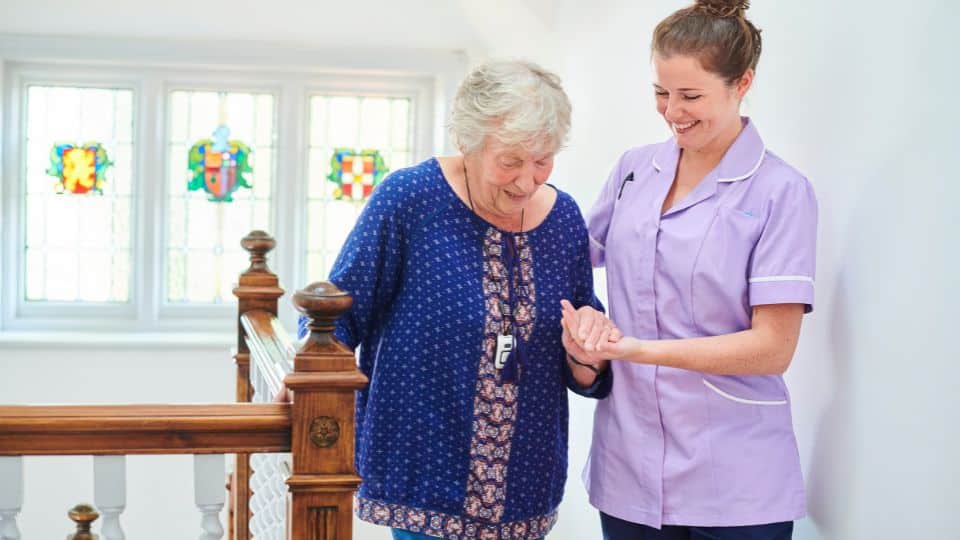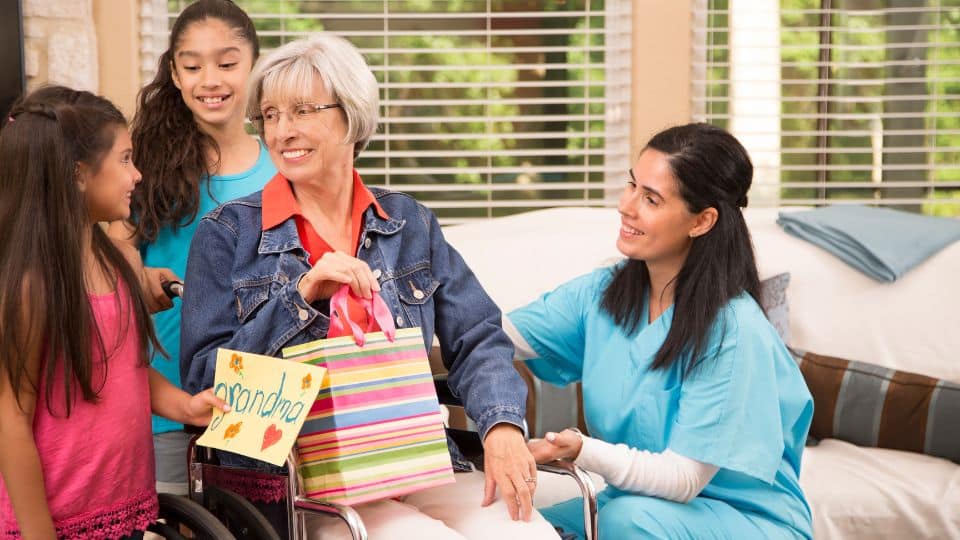What is it called when you help the elderly at home?
Home health care for the elderly refers to the compassionate and comprehensive support provided within the comfort of their own homes, addressing their unique physical, mental, and emotional needs. This specialized form of caregiving involves a range of services tailored to enhance their overall well-being and maintain independence.
Home health aides offer personal care services with daily activities such as bathing, dressing, medication management, meal preparation, and light housekeeping. Moreover, they diligently monitor vital signs and provide transportation for medical appointments or social engagements.
Home health care providers also prioritize companionship by engaging in meaningful conversations or participating in recreational activities that stimulate cognitive functions. With utmost dedication and expertise, these professionals ensure that aging individuals receive personalized attention while fostering an environment that promotes dignity and respect throughout their golden years.
Types of Home Care
In-home care combines several different kinds of assistance and different roles of the providers. It's possible to get a care plan that is specific to your needs depending upon your age. Assisted living services, personal assistance and in-home medical treatment offer the following types of services in the home: Keep in mind that when clients needs change they can change between different homecare services.
When it comes to providing adequate care for senior citizens, in home care services is an essential aspect that ensures their comfort and well-being. There are various types of home care available to cater to the specific needs of older adults, enabling them to maintain their independence while receiving the necessary assistance.
Firstly, personal care services encompass tasks such as bathing, dressing, and grooming, ensuring seniors can perform daily activities with ease and dignity.
Secondly, companionship services focus on alleviating loneliness by offering social interaction through conversations or engaging in hobbies together. This not only improves mental well-being but also reduces feelings of isolation commonly experienced among the elderly.
Thirdly, homemaking services involve light housekeeping duties like meal preparation, laundry assistance or grocery shopping which ensure a clean and organized living environment for seniors who may have physical limitations.
Additionally, medication management plays a crucial role in maintaining proper health by assisting individuals with adhering to prescribed medication schedules.
Lastly but importantly, skilled nursing provides medical support tailored specifically for those with chronic illnesses or recovering from surgery; this includes wound care management or administering specialized treatments under professional supervision.
Together these different types of home health care foster a comprehensive approach towards supporting elderly individuals in leading fulfilling lives within the comforts of their own homes.

Aging in place vs. other types of senior housing
When considering the options for senior housing, one important aspect to take into account is aging in place versus other types of senior housing.
Aging in place refers to the concept of allowing elderly individuals to stay within their own homes while receiving necessary assistance and care through various home health care services. This approach offers numerous advantages, as it enables seniors to maintain a sense of familiarity and independence within their cherished environment.
in home care services encompasses a wide range of services that can be tailored to meet individual needs, ensuring personalized attention and support at all times. From assisting with daily activities such as bathing, dressing, or meal preparations, to providing medical aid like medication management or physical therapy sessions; home health care professionals are equipped with expertise and compassion essential for maintaining optimal well-being among seniors who wish to age in place.
By contrast, other types of senior housing often involve relocating older adults away from their homes and communities into assisted living facilities or nursing homes. While these establishments offer professional caregiving around the clock alongside access to communal social activities, they may lack the comfort and personal touch that comes with remaining in familiar surroundings where lifelong memories have been made.
Additionally, moving out can also result in feelings of isolation or disconnection from loved ones for some seniors who rely heavily on familial support networks nearby if they were no longer geographically close due to relocation requirements associated with alternative forms of senior housing arrangements.
Assisted living facility versus in home care
When considering the best care options for elderly individuals, one must closely examine the differences between an assisted living facility and in home care.
In home care offers a unique advantage by allowing seniors to receive personalized assistance while remaining in the comfort of their own homes. This approach provides a sense of familiarity and security that can greatly enhance an individual's overall well-being.
With professional home health aides providing occupational and physical therapy services tailored to meet each person's specific needs, individuals can maintain their independence while receiving support with activities of daily living such as bathing, dressing, and medication management.
Additionally, in home care allows for continuity of physical therapy sessions within familiar surroundings, promoting better adherence to treatment plans and facilitating faster recovery times from injuries or surgeries. Ultimately, this comprehensive level of personalized attention offered through in home care ensures that seniors receive not only the necessary physical assistance but also emotional support and companionship on a daily basis.

What is aging in place?
Aging in place refers to the increasingly popular concept of enabling elderly individuals to remain in their own homes as they age, while receiving necessary support and care through home health care services.
This approach acknowledges that many seniors prefer the familiarity and comfort of their own living spaces, surrounded by cherished memories and belongings. In home care encompasses a comprehensive range of medical, personal, and emotional assistance provided by trained professionals within the confines of one's residence.
It ensures that seniors can maintain their independence while still benefiting from personalized attention tailored to meet their unique needs. From assisting with daily activities such as bathing, dressing, and medication management to offering companionship and ensuring safety throughout the house, these caregivers play an instrumental role in promoting overall well-being among aging individuals.
By prioritizing aging in place through dedicated home health aide services, older adults can enjoy a sense of autonomy while receiving essential support to lead fulfilling lives within familiar surroundings.
Companion Care Services
Companion Care Services specializes in providing exceptional in home care services, offering a comprehensive range of supportive services tailored to meet individual needs. With an unwavering dedication to enhancing the quality of life for seniors, Companion Care Services strives to create a nurturing and secure environment within the comfort of their own homes.
Highly trained and compassionate caregivers are carefully selected to provide personalized assistance with daily tasks such as meal preparation, medication reminders, grooming, and light housekeeping. The focus goes beyond mere physical assistance; it extends towards fostering meaningful companionship and emotional support by engaging in conversations, participating in hobbies or activities dear to the senior's heart, or simply offering a listening ear during moments of solitude.
This level of attentive care not only promotes independence but also ensures that each client feels valued and cherished throughout their golden years. Committed to maintaining open lines of communication with family members involved in their loved one's care plan, Companion Care Services offers peace of mind by keeping them updated on important matters concerning health conditions or any changes observed along the way.
By combining professional expertise with genuine compassion for those they serve, Companion Care Services sets itself apart as an industry leader dedicated to creating safe havens where aging individuals thrive while remaining connected with dignity and grace.
Personal Care Assistance
Personal care assistance plays a vital role in the realm of in home care services. It encompasses a comprehensive range of personalized services that are tailored to meet the unique needs and preferences of each individual.
With deep empathy and respect, personal care assistants provide compassionate support, ensuring comfort and dignity for aging individuals within the familiar surroundings of their homes. These dedicated professionals possess an array of skills, including assisting with daily activities such as bathing, dressing, grooming, and medication management.
They maintain a keen eye on safety concerns around the house while also providing companionship to alleviate feelings of isolation or loneliness that can often accompany old age. Moreover, personal care assistants collaborate closely with healthcare providers to ensure seamless coordination of medical appointments and adherence to prescribed treatment plans.
Through their unwavering commitment to enhancing quality of life for elderly individuals, personal care assistance truly embodies the essence of home health care.

Finding the right home care services for you
If you find your need for in home care services, then you can decide what home health services will be the right fit for you. Of course it is very hard for people to take care of their house and even their personal care. Having a basic understanding of home care providers is the easiest way to ease the pain.
You should first seek advice from a family member or neighbor. Some neighbors can also check your house or help you maintain it as often as you need. Some local religious organizations provide dinner and social activities for seniors.
Preliminary Interview by Phone
The preliminary interview by phone is an essential step in the process of selecting home health aide services. This initial interaction serves as a crucial means to assess the potential caregiver's compatibility and suitability for providing personalized assistance within the comforts of one's own residence.
The interviewer, armed with a comprehensive understanding of the specialized needs associated with caring for seniors, meticulously crafts questions designed to gauge both professional expertise and empathetic qualities. Their objective lies in assessing whether candidates possess not only the requisite skills but also a natural ability to foster trust, compassionately engage with clients, navigate complex medical situations, and adapt swiftly to changing circumstances and also offers the specific personal care you are looking for.
Through this telephonic encounter, valuable insights are garnered into prospective caregivers' educational backgrounds, certifications earned in geriatric care or related fields, prior work experience specifically within home health settings—highlighting their competence across various areas such as medication management or mobility support—and familiarity with specific illnesses commonly affecting older adults like dementia or Parkinson's disease.
Furthermore, interpersonal attributes are explored during this preliminary stage; it allows evaluating their communication style when addressing client queries or concerns while maintaining utmost professionalism throughout each interaction. Ultimately, this thorough exploration conducted through a preliminary phone interview ensures that exceptional care is delivered at every level when choosing suitable home health services for our elderly population.
Talking to a loved one about home care services
When it comes to discussing in home care services with a loved one, open and honest communication is crucial. Initiating this conversation can be challenging, as it often involves addressing sensitive topics such as aging, independence, and potential limitations.
However, approaching the subject with empathy and understanding will foster an environment of trust and support. Start by expressing your concerns in a gentle manner, emphasizing that their well-being is of utmost importance to you.
Highlight the benefits of home care services, emphasizing how they can enhance their quality of life while allowing them to remain in the comfort and familiarity of their own home. Share specific examples where professional caregivers could assist with daily tasks or provide medical assistance tailored to their unique needs.
Listening attentively to any apprehensions or objections they may have is important; providing reassurance by explaining that these services are designed specifically for enhancing independence can help alleviate hesitations.
Ultimately, remember that discussing home health care services should be approached delicately but assertively - focusing on maintaining dignity and promoting autonomy throughout the exchange.

Tips for hiring home care providers
When it comes to finding the right home care provider for elderly individuals, there are several essential tips that can greatly assist in making an informed decision.
The first tip is to thoroughly research and understand the specific needs of the individual requiring home care, as this will help identify which skills and qualifications are necessary in a caregiver. It is crucial to assess whether medical assistance or personal support services are required, such as administering medication or assisting with daily activities like bathing and dressing.
Additionally, considering any specialized care requirements related to conditions like dementia or Alzheimer's disease is pivotal. Another significant tip is conducting a comprehensive background check on potential caregivers. This includes verifying their credentials, certifications, licenses, and professional experience in providing home health aide services. Requesting references from previous clients or employers can provide valuable insight into their reliability and compatibility with seniors' unique needs.
Moreover, during interviews with prospective candidates, it is important to ask relevant questions that gauge their knowledge of elder care procedures while also evaluating their communication skills and level of compassion towards older adults. Lastly, discussing financial matters upfront ensures clarity regarding payment expectations and affordability while avoiding any future complications related to costs associated with home health care services tailored specifically for elderly individuals.
Discovering the Right Home Health Care Agency Near You
The choice of home health services is an exciting experience and requires both intellect as well as passion. Although the procedure may seem daunting, following them step by step is an easy step and will bring you to the perfect solution.
1) Registry sites for home health care : Registry sites do not simply list names of caregivers. These documents are more detailed and reveal information about caregivers' qualifications and areas of expertise. This enables you and the person in your life to meet each other's expectations and desires.
2) Family Reference: Your family experiences can make a huge difference to your life. Get to know your neighbors and friends.
Develop your skills and knowledge in support work for older people. Community Care Toolkit provides an online learning experience that helps you develop your skills and learn new ones.
Frequently Asked Questions
Hourly: How much does private home care cost per hour?
Among those seeking private homecare rates, these depend primarily on the services type and location. Typically the services offered in-home health centers include food preparation and simple housekeeping. Daily living activities such as showering and cleaning range from $20 a day to $35 a hour. Skilled nursing services: These services can cost up to 125 hours per hour.
How Can I Pay for Home Care?
Seniors and their families are having difficulty paying for services at home and in the community. In-home health care is generally affordable and accessible. Continue reading to understand the available alternatives and how they can reduce the cost to you. Private insurance Private insurance can provide some coverage for home healthcare. This generally applies to people who have long-term care plans since the majority of home health care services are not incorporated into a regular health plan. The longterm care plan covers senior care, as well as home health services.
What is a senior aid helper?
A senior aid helper is an essential component of in home care, providing invaluable assistance and support to older adults who require additional help in their daily lives. These dedicated professionals possess a deep understanding of the unique needs and challenges faced by seniors, ensuring their overall well-being is prioritized within the comfort of their own homes.
A senior aid helper offers a wide range of services tailored to meet individual requirements, including personal care such as bathing, grooming, and dressing, medication management to ensure adherence to prescribed treatments, meal preparation according to dietary restrictions or preferences, light housekeeping duties to maintain a clean and safe environment, as well as companionship that fosters emotional connection and mitigates feelings of loneliness or isolation.
By assisting with these tasks effectively while promoting independence wherever possible, senior aid helpers not only enhance the quality of life for aging individuals but also provide peace of mind for families knowing their loved ones are receiving professional and compassionate care at all times.
What is the point of a geriatric home?
Home care for the elderly has long been a crucial aspect of our society, with geriatric homes serving as an indispensable pillar in this domain. The point of a geriatric home is multifaceted and encompasses various aspects that cater to the unique needs of senior citizens.
Firstly, these facilities provide a safe and secure environment where older individuals can reside comfortably while receiving round-the-clock professional assistance from trained staff members. Geriatric homes are designed to address age-related health issues and offer specialized medical services tailored to each resident's requirements, ensuring their well-being is prioritized.
Additionally, these establishments foster social interaction among like-minded peers through organized activities and communal spaces, combating any feelings of loneliness or isolation that can often plague the elderly living alone at home.
Furthermore, geriatric homes aim to alleviate burdens on families who may be unable to provide adequate care due to work or other commitments by offering peace of mind knowing their loved ones are being attentively looked after by dedicated professionals. By providing holistic support encompassing physical, emotional, and mental well-being within a nurturing ambiance specifically crafted for seniors' needs – geriatric homes truly play an invaluable role in enhancing overall quality of life during one's golden years.
What is a geriatric caregiver?
A geriatric caregiver refers to a specialized professional who provides essential assistance and support in the realm of in home care. This compassionate individual possesses an exceptional understanding of the unique challenges faced by aging individuals, allowing them to cater to their specific needs with empathy and expertise.
Serving as a vital companion, a geriatric caregiver ensures that seniors can age gracefully within the comfort of their own homes while maintaining their independence and dignity. Their responsibilities encompass a wide range of tasks, including administering medications on schedule, monitoring vital signs, assisting with personal hygiene routines, planning nutritious meals tailored to dietary requirements or restrictions, and facilitating physical exercises or mobility aids when necessary.
With their keen attention to detail and comprehensive knowledge of senior health issues such as dementia or chronic illnesses like arthritis or diabetes, they are adept at identifying any signs of potential complications promptly.
Moreover, these caregivers offer invaluable emotional support by engaging in meaningful conversations and recreational activities that foster mental stimulation while combating feelings of loneliness or isolation among older adults. By seamlessly blending professionalism with compassion, geriatric caregivers become trusted allies in ensuring optimal well-being for our beloved elders throughout their journey towards graceful aging.
What is an example of geriatric care?
Ageriatric care describes the management of the health of older patients. This service includes specializing in medical treatment. Generally regarded as a geriatric service, these services include occupational therapy, physiotherapy, dialysis therapy & IV therapy.
Which patients most frequently require home health services?
Home care nurses usually help seniors, but they can also offer help to children and young adults who suffer from psychiatric issues.
What is the most common home care service?
Home Healthcare Services generally include nursing services depending on person needs. In consultation with the physician, an experienced nurse is required to develop plans for medical care.
Does Medicare cover home health care in Colorado?
Medicare provides home-based health assistance for patients who meet certain conditions and have other home-based services.
Conclusion
Home health care is an excellent option to help seniors stay in their own homes while getting the assistance they need. With personalized care services, qualified healthcare professionals, and access to modern medical equipment, home health care can be a great tool for seniors who want to remain independent and live comfortably in their homes.
Also, since it's significantly less expensive than other forms of long-term care options like assisted living or nursing facilities, home health care is often more affordable for families looking to provide top-notch support for their elderly loved ones.
Develop your skills and knowledge in support work for older people. Community Care Toolkit provides an online learning experience that helps you develop your skills and learn new ones.
